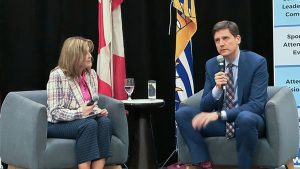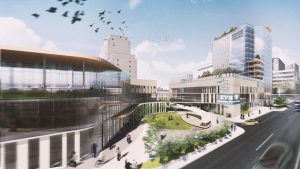During his recent throne speech, Manitoba Premier Brian Pallister promised to bring forward a new Referendum Act for residents to vote on major tax increases and provide a framework for calling and conducting a referendum.
Chris Lorenc, president of the Manitoba Heavy Construction Association (MHCA), believes new referendum legislation could be used to spur an honest public discussion on financing the province’s massive infrastructure deficit.
He suggested one place the province could start is with Pallister’s promise to reduce the Provincial Sales Tax (PST) from eight per cent to seven per cent by 2020.
One per cent of the PST is equivalent to about $300 million in annual revenue, which Pallister said he will recoup through savings and cuts.
“We don’t know yet what that referendum legislation means, but the reasons for suggesting a PST referendum is that it should be, and could be, and ought to be, part of a broader discussion of an overall review of an asset we have neglected for decades,” said Lorenc. “We believe that what the premier and this province should do is understand what challenges it faces with the condition of its transportation system, what the investment deficit is and what it needs. Second, the province needs to identify how it wants to fund those needs, recognizing that it is not an overnight fix. It is a legacy left by administrations over the years and not a problem unique to Manitoba.”
According to the MHCA, absent from the speech was any reference to a focused plan to strategically invest in Manitoba’s trade transportation system or highways. The speech also committed the government to maintain its current levels of investment.
When asked by the Journal of Commerce for comment on if it would consider a PST referendum, the province responded with its record on infrastructure spending.
“Our government was elected to fix the finances of our province,” said Infrastructure Minister Ron Schuler in a statement. “$350 million in highway infrastructure capital spending represents strong, stable funding for the construction industry and ensures that we maintain the safety of our highway network.”
Schuler added that $350 million in highway capital spending does not include the millions of dollars the province spends on preservation and maintenance of the highway network, on water infrastructure across the province, and on numerous other infrastructure projects ongoing including seven new schools across the province.
“We are spending $1B in strategic infrastructure this year as we committed to do,” he said.
Lorenc and the MHCA maintain they supported the government’s plans after they were told annual road spending would not dip below $500 million. The MHCA considers the cuts to be a broken promise.
The model for how to deal with the province’s financial woes is in its backyard, noted Lorenc. He said Winnipeg has done an excellent job at identifying its infrastructure problems and addressing them.
“To the credit of those mayors, there has been a concerted effort to do what I’ve described,” said Lorenc. “They know the condition of their assets. They have a long-term plan. One may quibble about adequacy of the long-term plan, but I’m less worried about that. I compliment (Winnipeg Mayor Brian) Bowman and his council for developing a plan and sticking to it.”
Earlier this year, the City of Winnipeg released its most recent State of the Infrastructure report, revealing that it faces a $6.9-billion gap over the next 10 years between the money it needs to fix or replace inferior roads, sewer, watermains and buildings and the revenue it expects to get to do the work.
The gap includes both repairs to existing infrastructure and new projects the city says it needs.
“The city will face difficult choices in funding capital projects, determining affordability, and what potential sources of revenue may be available,” stated the report.
Lorenc stated the transparent, honest discussion happening in Winnipeg needs to happen at the provincial level.











Recent Comments
comments for this post are closed